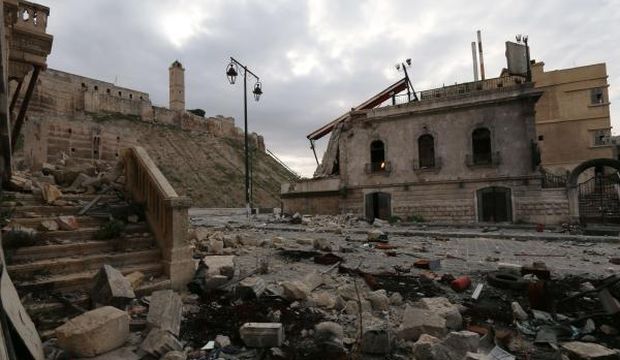
A picture taken on November 3, 2014 shows a view of the damaged UNESCO-listed citadel in the northern Syrian city of Aleppo. (AFP Photo/Zein Al-Rifai/AMC)
Beirut, Asharq Al-Awsat—Fourteen armed opposition groups in Syria’s second city, Aleppo, have signed an agreement to form a unified “Revolutionary Council,” in what may be a signal they are ready to hold talks over a UN-sponsored ceasefire plan for the city.
A source from the Syrian opposition who requested anonymity told Asharq Al-Awsat: “The formation of this council paves the way for possible talks with members of the military of the Syrian regime, after the first phase of the plan is implemented, which comprises the halting of all fighting and a declaration of a ceasefire.”
Rami Abdulrahman, head of the Syrian Observatory for Human Rights—which monitors the conflict on the ground from the UK—told Asharq Al-Awsat the formation of the Revolutionary Council in Aleppo had followed a period of division in the ranks of the Syrian opposition, and that various international actors had been working to organize talks with the FSA for several months but that the talks had been delayed until “domestic [opposition] revolutionary councils [such as the one in Aleppo] had been formed.”
The UN plan proposes the creation of a “safe zone” in the city following the “freezing” of all fighting and the declaration of a ceasefire between opposition forces and those of the Syrian regime, including a withdrawal of forces of all sides from the city.
Staffan de Mistura, the UN’s special envoy for Syria, said on Tuesday after meeting with Syrian President Bashar Al-Assad in Damascus that the regime was receptive to a ceasefire plan in Aleppo, which has for the last eight months suffered heavy bombardment by the Syrian army.
However, the main armed opposition group in the country, the Free Syrian Army (FSA), said it would not accept the UN proposal.
Abu Ahmed Al-Asimi, a member of the chiefs of staff of the FSA, told Asharq Al-Awsat the leaders of the organization had held a meeting on Tuesday after receiving the proposal, and that they had decided to reject it in its current form.
He claimed that the Syrian National Coalition—the main coalition of opposition groups, whose armed wing is the FSA—had left the decision entirely to the FSA itself.
Asimi said the group believed the plan should not be limited only to Aleppo, “because it would give the regime the opportunity to move into other areas and foil the advance of the opposition after the regime withdraws from Aleppo and heads to other areas.”
Other FSA commanders have publicly echoed these comments, saying their rejection of the plan is a purely “military and tactical” one.
They maintain that the regime’s advance across Aleppo is spreading its forces thin and weakening its positions in other areas of the country, an advantage which would be lost should a safe zone be created in the city requiring the withdrawal of these forces—which they say would then spread to other areas of the country where the Syrian regime is in need of reinforcements.
The FSA will, however, be holding a third meeting with de Mistura “in the near future,” according to Asimi, in order to “get a more detailed picture of the plan.”
During the previous two meetings between the FSA and de Mistura, the UN envoy proposed the creation of safe zones in Aleppo, “which resembled those which international efforts had sought to create in Bosnia [during the 1992–1995 Bosnian War],” Asimi said.
But Abdulrahman was skeptical regarding the likelihood of the FSA’s view of the plan being implemented on the ground.
“The talks may succeed when it comes to cities, but not when it comes to rural areas. So this [the plan being applied to other areas of Syria] is highly unlikely to happen, especially considering that the Islamic State of Iraq and Syria currently controls large parts of the country,” he said.
Abdulrahman was not able to comment on whether the new council in Aleppo would be the side holding the talks with the Syrian regime, though he did add that those fighters who were the signatories in the statement announcing the formation of the council were “among the moderate revolutionaries,” and were not members of any of the Islamist groups with a presence in the city.

The rebel fighters in Aleppo have only two choices: Either they unite themselves and accept the UN envoy’s proposal or be destroyed by ISIS or the Syrian army. Despite Turkish and French appeals to ‘save Aleppo’, no one is going to move a finger to save them. Even the expat opposition is washing its hands. They prefer to wait and see and join the wagon when it looks clear.